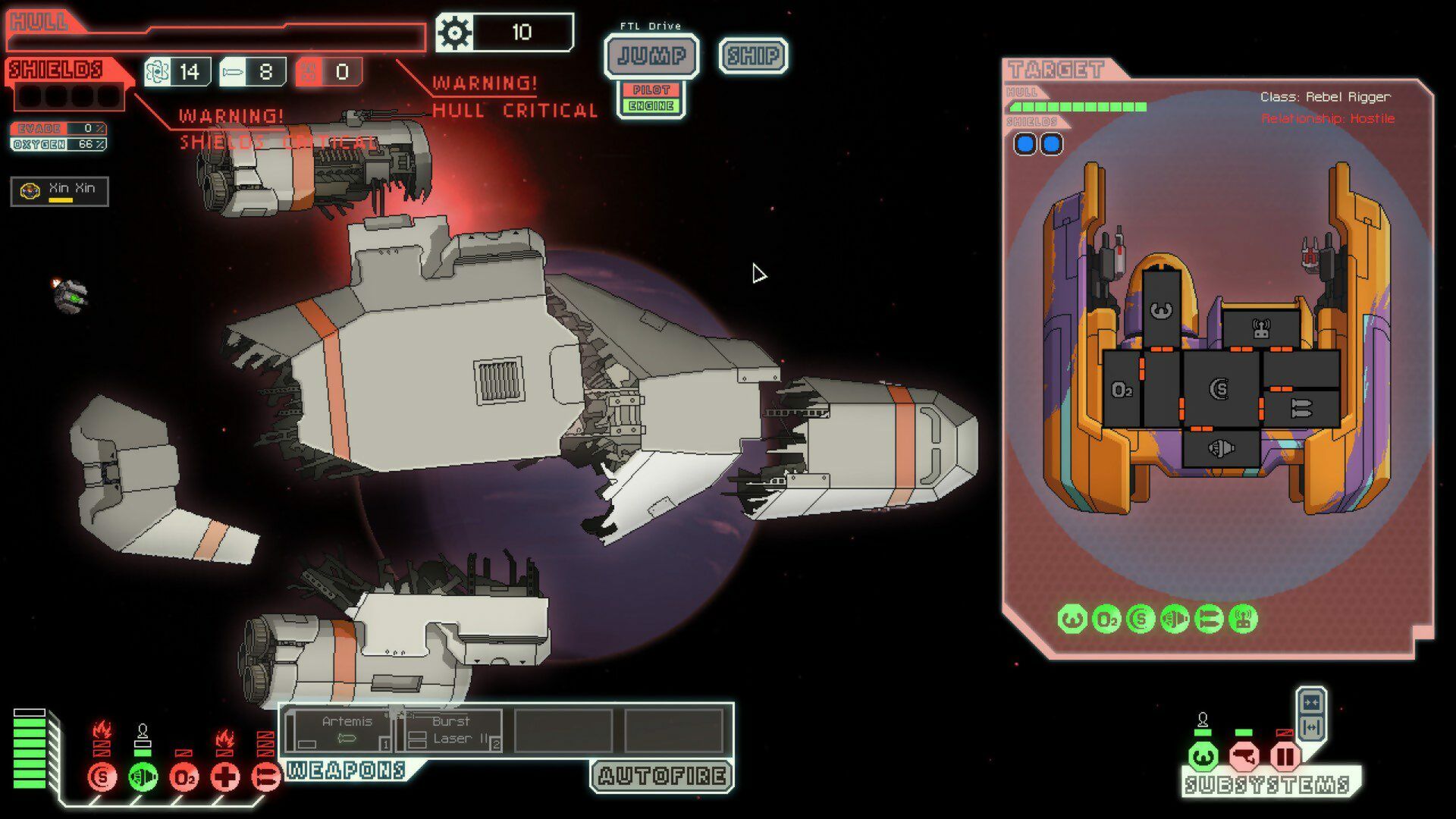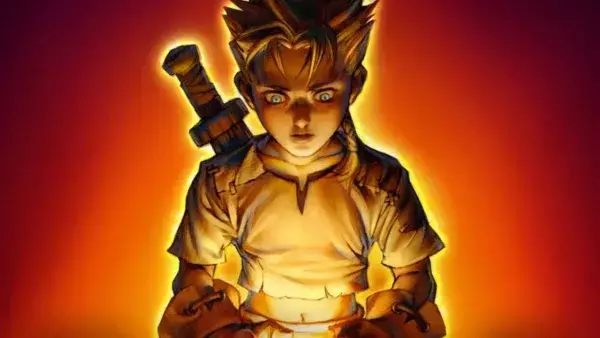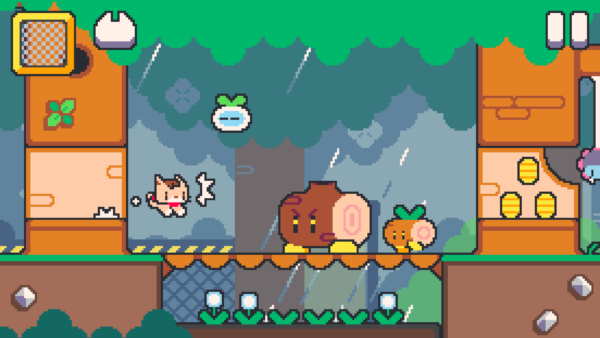
Whether death results in having to restart from the very beginning of a game, a character you’ve invested time into perishing, or losing items you worked hard to gather, there is one underlying principle that remains constant throughout games featuring the permadeath mechanic: mistakes bear heavy consequences.
While other titles might simply tell you to dust yourself off and try again – or maybe, like the arcades of yesteryear, tantalise with the offer to continue if you have the coin to spare – titles featuring permadeath make things far more clear-cut. You’re dead. It’s done. You either start again entirely, or you’ve lost a specific character forever.
It can be brutal, but it’s also a beloved facet of many games, and is often used by developers in different ways, and for very different reasons.
“We wanted to have the feeling of a suicide mission – a plucky crew risks terrible odds to hopefully pull off a daring feat,” explains Justin Ma, co-creator of FTL: Faster Than Light.
In the game – a spaceship-based roguelike placing you in the captain’s seat – you’re given the job of micromanaging your crew on a mission to save the galaxy. For Ma, artist and co-designer at Subset Games, using permadeath helped to replicate the stakes that are constantly present in space travel.
“Space is an inherently dangerous and life-threatening place,” he says. “The knowledge that one stray asteroid could lead to a chain reaction of events that eventually results in the destruction of your ship certainly feels close to the way I picture space travel would likely be.”
Permadeath was thought of as the best way to make this sense of threat resonate with players. “Some games would give this feeling through the illusion of danger without any real outcomes for failure other than reloading an auto-save,” says Ma. “We really wanted you to feel a sense of desperation, and that’s only possible if there are serious consequences for failure.”
Teddy Lee, part of the Rogue Legacy team at Cellar Door Games, says using permadeath in this manner requires a certain degree of resourcefulness to capture the player’s imagination: “On a narrative level it can be tough, and you need to be more clever with how you tell the story, since there isn’t really a singular protagonist you can identify with.”

Facing Death is less daunting when you’re wielding a massive broadsword.
Rogue Legacy is a 2D roguelike platformer riddled with fast-paced and decidedly difficult combat encounters, where each death brings the permanent demise of your current character. Standard fare. But from there, the deceased’s offspring takes up the mantle of hero. Where one falls, the next rises.
Stakes like these, when incorporated in games like FTL and Rogue Legacy can, however, provide the building blocks for you as a player to construct your own self-told narrative – a journey in which every decision you make can be the difference between a run coming to an abrupt end or progressing. It helps to make each hard-fought victory all the more substantial.
Until Death
Film and television’s use of death – and its finality – usually focuses on the desire to create a specific emotion, or have a scene resonate with the viewer. With that approach in mind, Supermassive Games sees permadeath as a necessity in achieving a cinematic, slasher flick style to its games. Pete Samuels, executive producer and series director for The Dark Pictures Anthology, says the team felt it learnt a great deal from Until Dawn, and applied that knowledge to the studio’s more recent title, Man of Medan (part of The Dark Pictures Anthology).
“One of the challenges we took on in the design and development of Man of Medan was to significantly increase the variation in the ways that characters could die,” says Samuels. “People found the deaths themselves a great source of entertainment, so we set out to increase the variety, as well as the number of possible causes of death.”
The twists, turns, and shocking moments that we recognise as being a cornerstone of film and television is brought to the fore in Man of Medan, only this time with the player acting as the director in their own horror film.

Who would have thought that your biggest concern in FTL would be doors?
Contrasting the way in which games like FTL and Rogue Legacy are reliant on the player to become invested in their own self-told narrative, in games like Man of Medan and Until Dawn, the player is given the opportunity to make decisions that will impact the direction a story will go.
But while giving the player the ability to have a real, meaningful impact on how events play out emphasises player agency and engagement in a storyline, it does come with challenges. Giving them the ability to decide who pays the ultimate price, for example, comes at a cost of its own. “Possibly the greatest challenge is ensuring that the player never feels cheated by the game,” Samuels says.
“The death of a character the player cares about feels like a huge price to pay for a poor decision or inappropriate reaction, and it’s important that the player always feels like it was their fault, that they could or should have acted differently, and that the game had given them sufficient information to do that.”
Becoming attached to a character who at any point can be snuffed out is a double-edged sword. The player becomes more invested in the story and their actions, but if a wrong decision is made or they fail to react quickly enough, there’s the risk the player may feel hard done by.
This use of permadeath as a core mechanic balanced with the need to keep the player on-side is a challenge Lee shared in the creation of Rogue Legacy. “Permadeath, if done right, should encourage players to learn the system, rather than memorise the system,” he says. “And it teaches this through consequence, which can also be fairly frustrating, so it’s a tough balancing act.”

With the odds stacked against you, sometimes you have to accept that Bad North will end prematurely.
If this balancing act is mastered, Samuels says, permadeath offers a lot as a mechanic. “I still believe that its biggest benefit in our games is that death is the ultimate consequence of a series of decisions, [which] makes the experience much more tense for the player… Losing characters from the player’s ensemble cast clearly demonstrates the breadth of the branching in our games, and helps to give each player’s experience a uniqueness.
“It’s also treated by many as a ‘score’, and people replay many times to get a perfect outcome where all characters survive, or to reach a conclusion where their favourite characters didn’t perish in some horrible way.”
North Bound
Permadeath can generate an emotion or help to drive forward a storyline. Public perception can, however, mean that permadeath comes with a bit of baggage. The mere mention of permadeath can bring some players out in hives, with images of incredible difficulty, insurmountable odds, and a hell of a lot of lost progress springing to mind.
For Richard Meredith, programmer and designer at Plausible Concept, however, permadeath isn’t about sheer difficulty – rather, it’s about creating a kind of experience that ensures players engage with the systems surrounding them.
A minimalistic, real-time strategy roguelike, Plausible Concept’s Bad North sees you defending islands from invading Vikings, doing your best to manoeuvre your soldiers, and establish your defences to ensure the interlopers can’t claim your land.

Knowing your actions will decide whether your favourite characters survive Man of Medan is a very powerful thing.
“Normally in Bad North, you’re positioning troops and basically setting up a defensive line that most of the time holds pretty well,” Meredith says. “All of a sudden, things can turn on a knife-edge and can start going very, very badly for you.”
As you might expect, it can be a stressful experience to see your plans fall to pieces in a matter of moments thanks to an unexpectedly tough invasion force. “That panic and stress in very short bursts, against the background of it being mostly quite calm and relaxing, is a really strong thing,” Meredith says.
As you travel from island to island the potential of losing a commander – and as a result, the units they are in charge of – is a constant, ever-increasing problem. “Permadeath introduces some additional stakes, and makes it really hit home that it’s important to solve this problem rather than just going back to a previous save [and destroying any] real stakes,” Meredith says.
This use of permadeath as a tool to encourage players to engage with a problem at hand – and to learn the mechanics of the game – is a tactic shared by Lee. “I’m a big fan of game systems where the player needs to learn the rules,” he says. “It’s why almost all our games have some kind of reaction-based component to the combat, since just giving enemies a touch of ‘random number generator’ in how they react to the player means you can’t memorise patterns.”
After some discussion with Lee, it became apparent that permadeath in Rogue Legacy was considered secondary to the real goal of encouraging improvisation – and ensuring that dying felt fun. As each death brings with it the opportunity to take control of a new character, with different traits from the last, it means each generational playthrough feels different to the player, and they remain invested in the action. And while there’s less use of randomised elements in Bad North, the sentiment is the same.

Try naming your FTL crew members after your loved ones. It makes decisions much harder when you’re deciding if you’d rather sacrifice your wife or your best friend.
“The instances where something happens like [the unexpected, overwhelming invasion] becomes a defining moment of the playthrough that you had,” Meredith explains. “You remember the moments when someone died, especially if that involves you panicking to still win the island, or you panicked to get off the island and that all came together.”
Reapers Creepers
Some games are built around permadeath, while others adopt it in an attempt to galvanise other previously made mechanics in a game, but occasionally there’s a title where permadeath comes about by chance. In Subnautica, an open-world survival game, the player can choose permadeath through its ‘Hardcore’ mode.
Charlie Cleveland, CEO and design director at Unknown Worlds Entertainment, explains how this implementation of permadeath came about. “One of the big early influences in Subnautica – though you probably can’t see it – is Spelunky. I was playing it a lot as we started to make Subnautica. Early on, we thought [of having] a lot more roguelike elements in the game: procedural levels, a focus on replayability, low-level creature interactions, precise tool usage, puzzle-like navigation, and permadeath.”
After spending a long time with these elements and struggling to make them work in an underwater setting, Cleveland came to a realisation: “In Subnautica, you’re essentially flying. So, we could never constrain the player easily with gravity or walls – our environments worked best when they were wide open, especially as we wanted to accommodate vehicles. We also didn’t have dense enough creatures to create emergent ‘reactions’. So we ended up cutting everything that wasn’t working, and we were left with simply the permadeath.”
With Hardcore mode being exactly that – a mode for those seeking a tougher challenge – it’s seen by Cleveland as an extra way to experience the game, and not necessarily the ‘true’ one. Approximately six-to-eight percent of those who play Subnautica do so with permadeath on – far smaller than the 59.9 percent who do so on the standard ‘Survival’ mode. In this instance, permadeath came about near-enough by accident, and is regarded as an added bonus for those who wish to take their oxygen count and nutritional needs very seriously.
Developers use permadeath for many reasons. But by stepping away from the safety net provided by auto-saves and checkpoints, players can open themselves up to genuinely thrilling moments. From the heartbreak of losing a beloved character to the exhilaration of narrowly surviving a space battle, permadeath brings something rare to video games: a sense of genuine fear, a risk of loss, and real consequences for your actions.





